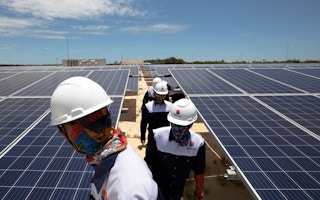Change happens gradually at first – then faster than you ever thought possible.
When it comes to climate change, we find ourselves sandwiched between an escalating threat and an exponential opportunity.
In July alone, record temperatures were set and broken daily across the world, making it almost certain to become the hottest month on record. This extreme heat is coming on top of escalating droughts, fires and floods, all reinforcing what the science is screaming at us: climate destruction is becoming more prevalent and extreme.
We always knew transformational change was going to be needed when the world adopted the Paris Agreement at COP21. Since those historic climate talks in 2015, so much has changed – and yet so little at the same time.
Now, as we hurtle towards the 28th annual United Nations climate talks, COP28, and as the world still reels from a global pandemic, economic downturn and energy crisis, the first Global Stocktake – the UN’s assessment of progress against the Paris climate commitments – is set to conclude.
We already know that the conclusion will say we’re not on track to deliver those hard-fought global goals. Yet the risk of just assessing lack of progress to date is that we miss the innovation and momentum already happening today.
Explosion of green growth
The reality is that exponential change is becoming the new normal, revolutionising our economy. From solar and wind, to electric cars and batteries, exponential growth is happening faster than we thought possible – a fact that shouldn’t be a surprise given history shows us technological transitions have always happened this way.
The power sector is a shining example. New analysis from think-tank RMI shows surging solar, wind and battery technology capacity are now outpacing even the most ambitious International Energy Agency scenarios for net zero emissions – and means the electricity system is ahead of the curve to reach net zero.
This is system transformation in motion. These forecasts show that solar and wind will supply over a third of all power by 2030 – up from around 12 per cent currently – while the major cost declines seen over the past 10 years will continue, with solar and wind roughly halving in price again by 2030.
Crucially, fossil fuel demand for electricity will be in steep decline, down by 24 per cent from the 2022 peak. No surprise, as the cost of building new solar and wind is already 40 per cent less on average than coal or gas. This is further proof that, despite wishful thinking from some in the fossil fuel sector, the decline of fossil fuels is now inevitable.
Eight countries in particular – from across Africa to South America – are already outperforming and seizing transformational benefits.
New research from Systems Change Lab shows that Denmark, Uruguay, Lithuania, Namibia, the Netherlands, Palestine, Jordan, and Chile have already scaled up solar and wind at rates faster than what’s needed globally to limit warming to 1.5°C based on IEA scenarios – unlocking widespread societal, financial and health benefits from clean air, new jobs and energy security. These are diverse countries too, with different electricity needs, populations and GDP, showing that a rapid transition is possible in many different contexts.
Increasingly we are seeing emerging markets lead the way, being the most ambitious and creating the energy systems of tomorrow. For example, in Kenya, a growing renewable hotspot in Africa, renewable energy sources already account for roughly 90 per cent of its power needs with the aim of 100 per cent by 2030 – a plan that is attracting new investment for the country.
Electric transport is another example and one that is surging in all markets. In 2022, electric car sales exceeded 10 million globally. Last year 14 per cent of all new cars sold were electric, up from 9 per cent in 2021 and less than 5 per cent in 2020, surpassing all predictions on how long it would take the industry to reach such a market share. China continues to lead electric vehicle sales, but it’s countries like India, this year’s G20 host, that are seeing record sales with a 174 per cent increase in 2022.
Businesses competing to seize this rapidly growing market are driving innovation and new breakthroughs in battery technology. Tesla, Rivian and BYD have all surprised markets with their sales growth.
G20 commitment needed
To reach and pass cost parity tipping points in other key sectors across heavy industries – like cement, steel, shipping and others – we need to rapidly create strong future demand signals, put in place supportive government policy and remove investment barriers.
G20 countries have a critical role to play, and after recent lackluster ministerial meetings, the G20 Leaders’ Summit next month in New Delhi must be a moment when countries commit to investment and scaling up of renewable energy – something the UAE COP28 Presidency is also calling for – and seize the benefits of this exponential growth.
The economic case is clear. Our ability to innovate is remarkable. Exponential change happens because we commit. We have done it before, and we are already starting to do it again.
Nigel Topping is former United Nations Climate Change High-Level Champion for COP26.
This story was published with permission from Thomson Reuters Foundation, the charitable arm of Thomson Reuters, that covers humanitarian news, climate change, resilience, women’s rights, trafficking and property rights. Visit https://www.context.news/.








